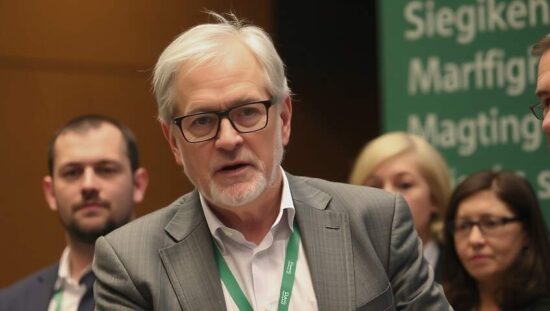Baden-Württemberg’s Ministerpräsident Winfried Kretschmann has accused the Greens of having an unclear stance on migration. “My party has not succeeded in its broad support in clarifying both the limitation of irregular migration and the facilitation of legal migration, such as the entry of skilled and professional workers” Kretschmann told the Funke-Mediengruppe (Thursday editions).
Humanity, according to the Green politician, only exists “in order”. “If I have order, I will limit it; otherwise, I will have open borders. This is what the Greens originally fought for and it is obviously unsustainable. A community cannot do this” Kretschmann said.
He explained that humaneness and order mean in practice limiting irregular migration and facilitating legal migration. He added that there is “no real clarity in my party on this issue to this day and this is what we have now paid for with a heavy electoral defeat.”
The Asylum Act and the Geneva Refugee Convention serve to take in politically persecuted and war refugees. They are not meant for people who are migrating due to lack of prospects, said Kretschmann. However, a significant part of migration is driven by this and repatriation is difficult. “Then, the Asylum Act begins to erode under pressure.” If irregular and legal migration cannot be separated, “then we have the situation we have now and one should not be surprised if right-wing populist parties are increasing everywhere” the Ministerpräsident warned. “And if they have something to say, then a humanitarian refugee policy is over.”
Kretschmann emphasized the importance of transit centers at the EU’s external borders, as proposed by the European asylum reform. “We know that it is very difficult if someone has crossed the border, because we are a rule of law state and it is hard to get them back. They might not have any papers. So, where do you send them back? These are all problems” the Green politician said. “That’s why: Transit centers should be set up at the borders. If someone comes to the border and claims asylum and then we have to let them in, this will not work in the long run; it simply does not work.”
He pointed to decisions made by the Ministerpräsidentenkonferenz on migration and appealed to the future federal government to implement them: “We need a functional refugee and asylum system and we have made corresponding proposals in the Ministerpräsidentenkonferenz and the new government will certainly implement them. We will see what they come up with.”
As his most challenging political decision, Kretschmann referred to his approval in the Bundesrat to classify the Western Balkan countries of Serbia, Macedonia and Bosnia-Herzegovina as safe countries of origin in 2014. “I knew that I was going to have a big part of my party, which means a majority of my party, in a very contentious disagreement” Kretschmann said. “And that was the case; it met with broad misunderstanding that I agreed to it and it has not really been forgiven by the party for many years, if one can say so.





